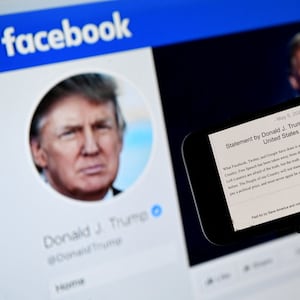Upheld. Ruled. Overturned. Remanded for further clarification.
To listen to the news Wednesday morning, you might think that a Court had made a decision, one worthy of the analysis of legal scholars, plumbing it for precedent and meaning.
In fact, what happened is that Facebook—much like many other big corporations that pay outside consultants huge fees to help make decisions—hired a bunch of elites with good CVs. And then—like many corporate consultancies--it gave them a tiny little slice of corporate decision-making to review. The grandiosely named “Oversight Board” which“ruled” today that Donald Trump can’t yet rejoin Facebook and Instagram—actually lacks any capacity to understand the financial motivations and metrics behind Facebook’s decisions, or to mandate a different business model. It is simply corporate consultancy rebranded as an “Oversight Board.”
The difference between this and most corporate consultancies is that it is first and foremost a public relations stunt, one designed to make people feel like Facebook somehow has a serious self-regulatory regime as news outlets report on the Board’s “ruling.”
We should not make a bunch of paid corporate consultants into a Court. No matter how lovely and thick the theatrical curtain put between Zuckerberg and the consultants, they are not publicly accountable and there’s real harm in normalizing the idea of a Court that is not, in fact, a Court but a wholly private set of contracts.
The consultants’ decision was catnip (to law professors of course, who love nothing more than a hard hypothetical) but also to people who long for some authoritarian entity to make hard decisions for us, the public, in a simple, non-democratic way.
Facebook’s authoritarianism is a terrible response to Trump’s dangerous lies and bigotry. The enemy of your enemy is not your friend—they represent two competing visions of abuse of power.
The minute we start anticipating a corporate decision with the intensity that we anticipated today’s decision is the minute we should realize Facebook is way too powerful. It controls the faucets on the flow of information, and decides which news stories thrive and which ones are hidden, what is scientifically backed COVID advice and what is not, what is terrorism and what is expression, and what constitutes a conspiracy and what does not. And it does all this based on cash flow.
We still don’t know how much money it made on QAnon posts (billions?) but so long as we are fighting about whether or not to ban those posts, instead of fighting about whether we, as a society, should allow the arteries of information to be controlled by a business model that will keep propagating new conspiracies, we are having the wrong debate.
Facebook loves it that we are debating the corporate consultant’s text as a legal document. It focuses our attention on the conflicts between the consultants and Zuck, instead of on the more fundamental conflicts between Facebook and democracy. It makes us ask, “what will Zuckerberg do?” when we should be asking, “when will Congress act decisively?” It puts our attention on some fancy academics when our attention should be on Joe Biden, Chuck Schumer, Nancy Pelosi, and the Republicans in the Senate.
Here’s what we should be talking about today:
Is it enough for Facebook to be split up from Instagram and WhatsApp, or should we also split it up from all non-social media companies, like Messenger, to limit its outsized power?
If we want to treat big social media companies as infrastructure, does that mean banning all behavioral advertising?
How can we change our antitrust laws so we never again have to deal with gargantuan power like this after the fact?
Facebook is a company that has little public trust for good reason: Mark Zuckerberg and Sheryl Sandberg and their PR machine continually leak, lie, and break the law. There’s reason to think executives could be prosecuted criminally because of price-fixing allegations in current cases. Having monopolized social media, it steals from small businesses that pay jacked-up advertising costs because they have no choice. The quality is horrific: the platform abuses people’s privacy with abandon, and is swampy with misinformation but again, small and local advertisers have no choice. What are they going to do, advertise on Facebook-owned Instagram in protest?
Anytime you use the word “Court” or legitimize this panel’s decision by taking it seriously, you are part of Facebook’s effort to distract from the corporate and democratic disaster that it is.


